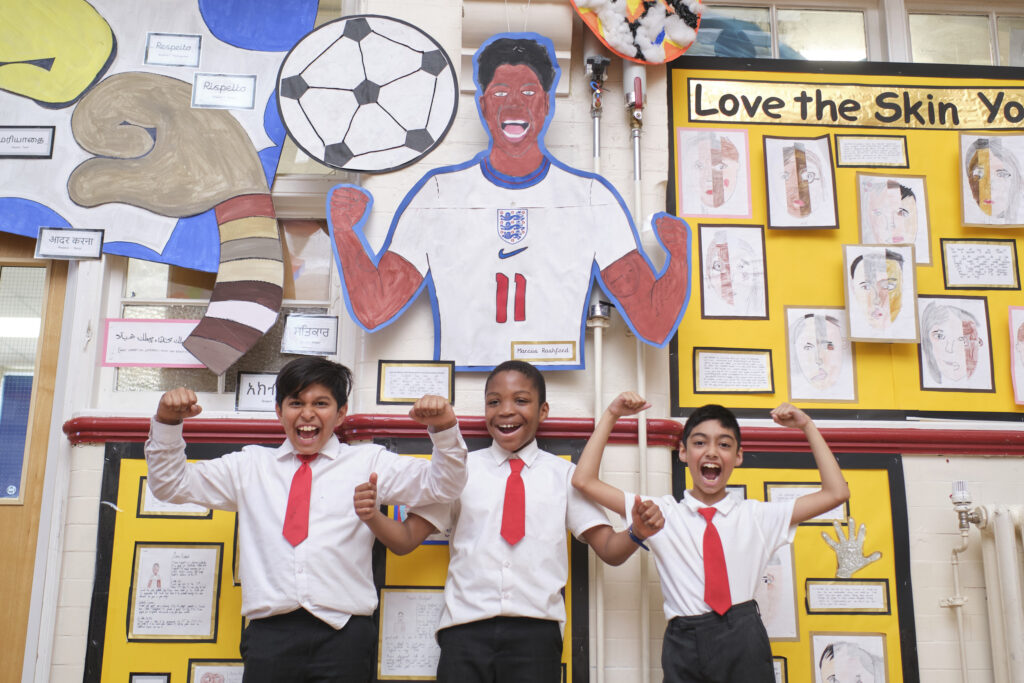Monega Primary: ‘Inclusion is our core value’
In May this year, Richard Rieser visited Monega Primary School in the London Borough of Newham. The school’s vision and ethos statements is: ‘A happy, inclusive, caring school, where every child matters’. Our approach encourages all children to be enthusiastic lifelong learners.’
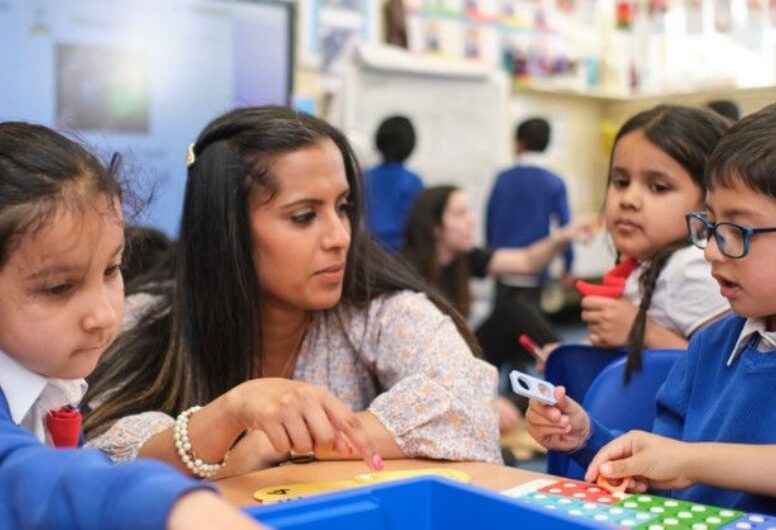
Monega Primary school is housed in an old School Board, triple decker, brick-built school from the 1900s. Located in Manor Park, Newham, it serves a diverse catchment area, with 40 languages spoken. Monega has 700 children in three forms per year group and two nursery classes. The school has 42 pupils with complex needs and 70 pupils on the SEN register. In the four years since joining Boleyn Academy Trust, Monega, which is committed to providing an inclusive, high-quality education for all, has moved from being classed inadequate (in 2017) to outstanding (in 2022) by OFSTED.
Katie Ives, the SENCO and the assistant head teacher, who learned her craft as an inclusive educator at Tollgate School (See issue 50 Summer 2018 for an article on the school), explains why Monega’s commitment to pupils with SEND is a highly successful aspect of work across the school:
“All on SEND Register have Individual Education Plans with half-termly targets. All of them have a personalised package of support delivered in the mainstream classes with withdrawal kept to a minimum.”
Complex needs include Down syndrome, autism spectrum, global development delay and speech and language needs. They have differentiated work and peer support is strongly encouraged. A buddy system operates at break and lunchtime. There is no bullying towards Disabled pupils. They start with their peer group in nursery or reception and go up the school together and the non-disabled children, especially the girls, are very loyal and protective to their Disabled peers.
 Katie stated that COVID-19 had a minimal impact on the education of pupils with SEND. All pupils in receipt of Education Health and Care Plans (EHCPs) were invited into school every day, as well as keyworker’s children, which included school staff. All children in the school take part in shows and performances and go on residential trips, where their parents agree. One innovation is a school camp where each year group, for one night, camps (usually a Thursday term time night) in tents in the school hall, and then have campfires in the playground to toast marshmallows.
Katie stated that COVID-19 had a minimal impact on the education of pupils with SEND. All pupils in receipt of Education Health and Care Plans (EHCPs) were invited into school every day, as well as keyworker’s children, which included school staff. All children in the school take part in shows and performances and go on residential trips, where their parents agree. One innovation is a school camp where each year group, for one night, camps (usually a Thursday term time night) in tents in the school hall, and then have campfires in the playground to toast marshmallows.
The school has a family support worker and a coordinator for medical needs, all of which build strong links with parents and the local community. I witnessed a pre-reception session for those joining reception in the autumn, who are not in the two nursery classes, where staff were getting to know the children and their parents, and the children were undertaking a variety of exciting activities.
All children make progress, whatever their starting point, with a great team of teaching and support assistants who meet every day with the class teacher, before school for 10 minutes and after school for 30 minutes. This ensures that the Quality First Teaching is adapted to the needs of all learners. To back this up, in the Intervention Room (a support/small group room) are cupboards of differentiated learning materials often visual, collected and compiled by the SENCO. These are customised by each class teacher and their team and then added back in the resource cupboards.
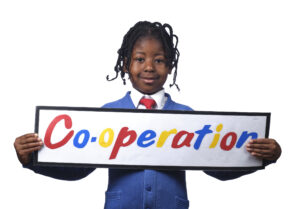 Given the number of pupils with autism, behaviour could be a big issue, but all staff are trained to deal with dysregulated behaviour with a range of strategies. These include fidget toys and differentiated behaviour approaches.
Given the number of pupils with autism, behaviour could be a big issue, but all staff are trained to deal with dysregulated behaviour with a range of strategies. These include fidget toys and differentiated behaviour approaches.
The Pupil Premium allow for pupils to be timetabled for Cantonese, which children labelled with complex needs can access. Two physical education (PE) instructors run extra sessions for pupils labelled with complex needs, SEND PE, three mornings a week to develop their skills and deliver their occupational therapy targets. They then also take part in PE with their whole class and, additionally, this team run art interventions.
All teachers are expected to teach all children in their class. The school provides regular training every Monday evening and subject lead teachers can attend training at the Boleyn Hub, with teachers from eight other schools, to share and develop practice. The SENCO and the SEND team ensure that all pupils have targets, materials and curriculum materials adapted to their levels.
The head teacher, Elizabeth Harris, is an Autism Spectrum Condition (ASC) specialist. Along the SENCO, they have developed very useful pathways for pupils labelled with complex needs, with a pupil profile and a learning profile, which includes sensory learning, word learning, sentence learning and story level learning. From this level, a schema for the bottom 20%, based on attention, memory, language, processing, organisation, and independent learning tasks ensures waves of intervention, not just for those with SEND but also those with English as an additional language. The Pupil Premium allows for many of these interventions. This results in much better progress in learning for this cohort than for the average.
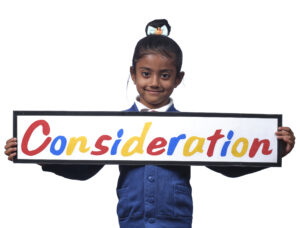 Monega uses MAPP (Mapping and Assessing Personal Progress), to supplement the statutory pre-key stage standard assessment tools in reading, writing and maths, to ensure a full breadth of coverage of personalised progress. The system assesses four aspects of skill using a 10-point scale across the whole curriculum. The four areas are: independence, fluency, maintenance, and generalisation. This system gives all educators a snapshot of where children with complex needs are, in all areas of their learning, as they progress to National Curriculum levels and focus on developing skills in what they are interested in.
Monega uses MAPP (Mapping and Assessing Personal Progress), to supplement the statutory pre-key stage standard assessment tools in reading, writing and maths, to ensure a full breadth of coverage of personalised progress. The system assesses four aspects of skill using a 10-point scale across the whole curriculum. The four areas are: independence, fluency, maintenance, and generalisation. This system gives all educators a snapshot of where children with complex needs are, in all areas of their learning, as they progress to National Curriculum levels and focus on developing skills in what they are interested in.
Head teacher, Ms Elizabeth Harris says about the school:
“Monega Primary School is a welcoming and happy school, where everyone is caring, considerate and respectful of each other. The children are very polite, work very hard and are committed to their learning. Safeguarding is given the highest priority and we work in partnership with parents and carers. We very much value the support and contribution that parents and carers make to school life. The strong cooperation across home and school means that we can reinforce the highest expectations.
We have carefully designed our curriculum to be progressive, ensuring pupils have a rich, relevant, broad and balanced education which is in line with the National Curriculum. Our aim is that all pupils will find passions, strengths and interests in both subjects and learning techniques that will prepare them well for future learning.
We teach subjects discreetly to ensure that all subjects have value and important knowledge is acquired and embedded. Our pupils are provided with rich opportunities to ensure that they are excited about their learning and challenged to achieve their very best.
Enrichment is a very important aspect of learning at Monega. All areas of the curriculum have enrichment opportunities that include visits to museums, theatres, exhibitions, festivals, and residential visits. We work collaboratively with community organisations to provide opportunities in dance, drama, and arts. Our musician in residence ensures that music composition, performance and singing are an important part of school life.
We offer a large selection of after school clubs, including booster and tuition sessions to ensure that all children meet their full potential.
At Monega, we are very fortunate to have such a dedicated team of teachers, teaching assistants and other staff members who strive to ensure that every child is successful, confident, and responsible. The school standards are above average and the quality of teaching across the school is excellent. Strong outcomes in pupils’ books, pupil and parent voice and our academic achievement demonstrate the impact of our approach.”
Asked to consider whether high quality mainstream provision can exist alongside inclusive provision, Ms Harris replies that, in her experience, that is a yes. Out of eight inclusive schools in the Boleyn Trust, five are rated outstanding and three are rated good by Ofsted. Performance is above the national average and local performance. They have high expectations for everyone. They have good support for teachers to differentiate well, and good levels of intervention to enable children to meet their potential.
Conclusion
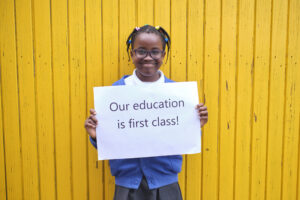 Monega Primary school is a shining example of how inclusion can become a reality in many more schools. If the government were to learn from Monega’s inclusive practice, they would put inclusive values and practice at the heart of their SEND Plan of Action.
Monega Primary school is a shining example of how inclusion can become a reality in many more schools. If the government were to learn from Monega’s inclusive practice, they would put inclusive values and practice at the heart of their SEND Plan of Action.
By Richard Rieser, World of Inclusion Ltd
![ALLFIE [logo]](https://www.allfie.org.uk/wp-content/themes/allfie-base-theme/assets/img/allfie-logo-original.svg)
